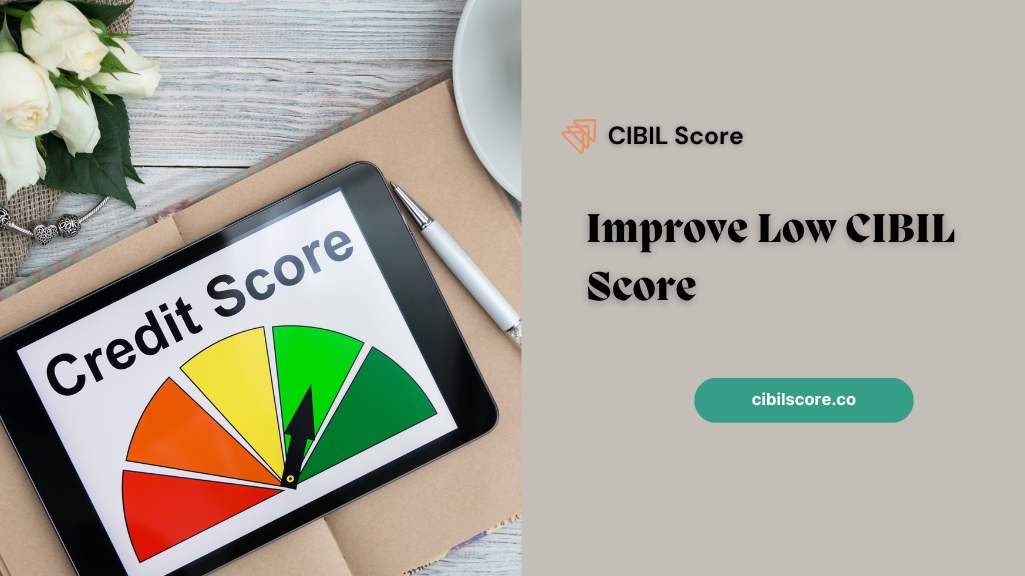How to Improve a Low CIBIL Score?
Poonam Junjunwala
. 2 min read
The CIBIL score, developed by credit bureaus and developers, is crucial for securing the best credit cards, faster loan approval, and favorable interest rate negotiations. A higher CIBIL score increases the likelihood of accessing these advantages. It's important to highlight that individuals with low CIBIL scores may still get approved for a loan/credit card, but they will face higher interest rates.

What Kind of CIBIL Score is Considered Good?
A CIBIL score is a three-digit numerical summary that defines a borrower’s creditworthiness. It depends on the borrower's income, level of financial stability, and other aspects of their financial situation, in addition to their past credit history.
Ways to Improve Your Credit Score
The subject of how to boost credit score is one that has been occupying many people's minds. The first step in improving or boosting your CIBIL score is to obtain a report on your CIBIL score. If you register with many online financial marketplace websites and some institutions, you can get free CIBIL reports.
Review Your CIBIL Report for Accuracy
It’s extremely important to ensure that all information on your CIBIL report is accurate. Your CIBIL score may suffer as a result of an error or a discrepancy that is reflected on your CIBIL report. You should file a dispute with the Transunion CIBIL and your lender if you discover any incorrect information.
Acquire a Diverse Assortment of Credit
You should work toward establishing a diverse range of credit, including some short-term loans with low rates of interest, a few credit cards, and some secured long-term loans such as auto or home mortgages. This helps you build up your credit score and demonstrates to potential lenders that you can be responsible with your money management. It's possible that the banks will view it negatively if you take out a significant number of unsecured loans.
Make Prompt Payments on Your Credit Card Bills
Borrowers need to make a point of timely paying back any outstanding balances on their credit cards. They will see a direct drop in their credit scores if they miss payment deadlines or make payments late. It will also reflect how well organized their approach is to the management of their finances. To ensure that one does not forget to make a credit payment, one can enable auto-pay options or set up reminders.
Put a Cap on the Use of Credit
According to research conducted in the past, keeping one's credit utilization below 30% can help one's credit score. A cardholder's chances of optimally increasing his or her credit score will be hindered if the cardholder uses it less.
Ensure that you have a Healthy Mix of Credit
The fact that you have accounts in a variety of credit categories demonstrates that you are a responsible borrower who is able to successfully manage a variety of credit obligations. Your credit history information bureau (CIBIL) score can be significantly improved if you keep a healthy balance of different types of secured and unsecured loans.
Pay your dues on time
Your history of making payments on your debts is the single most important component that goes into calculating your CIBIL score. Therefore, making sure that you pay all of your bills and EMIs on time, including those for your credit cards and loans, can provide a significant boost to your CIBIL score.
Dispute Inaccuracies
After reviewing your CIBIL report or if you have a disagreement with a particular transaction that was made through the vendor, you should make sure to dispute any errors as soon as possible on www.CIBIL.com. You could also check your credit score with CRIF High Mark or Equifax.
Provide Collateral and get a Co-Signer for the Loan
It will be easier for you to get approved for a loan if you already own any assets that you can put up as collateral against it. Lenders are always going to be more willing to hand over their cash if they are aware that they have some sort of security to fall back on.
More Stories from
Canva: Empowering Creativity and Design Simplicity
Discover how Canva, the user-friendly graphic design platform, has revolutionized the world of visual communication.
Best Summer Destinations in Japan: From Beaches to Mountains
This article introduces some of the best summer destinations in Japan.
The Rise of Virtual Travel: Exploring the World from the Comfort of Home
This article explores the surging popularity of virtual travel, a modern phenomenon that allows individuals to experience the world's wonders from the comfort of their homes.
The Art of Photography: Capturing Moments that Last a Lifetime
In this article, we explore the fascinating world of photography, tracing its evolution from its early beginnings to the digital age.
English Grammar: A Comprehensive Guide
This article provides a comprehensive guide to English grammar, covering essential topics such as parts of speech, sentence structure, tenses, and common grammatical errors.






.png?width=40&aspect_ratio=1:1)

.png?width=40&aspect_ratio=1:1)
.png?width=40&aspect_ratio=1:1)



